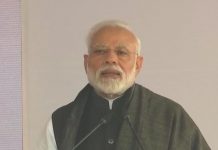
There is an old saying but still very much in vogue,“Those who eat together, stay together.” In the caste and religion riddled political scenario of the present-day Uttar Pradesh, this saying has necessitated the addition of another angle to it “to eat together, stay together and also stay at a Dalit household overnight” if you wish to reap rich harvests at the hustling.
In phase one of the now renamed Gram Chaupal Abhiyan, which lasted till May 5, there was a mandatory clause of ‘night halt’ attached to the directive. But from June 1, when the second phase starts, this condition has been done away with from the ambitious rural outreach programme.
Under this 15-day programme Chaupal Abhiyan, the state government will cover around 50,000 village panchayats and 13,500 villages. The various schemes of both the State and Central government will be monitored and reviewed. Also, enrolment of eligible persons for various government schemes will be done on the spot.
Launched by Prime Minister Narendra Modi on BR Ambedkar’s birth anniversary, the first phase was not without hiccups. These chaupals were designed to assuage the feelings of the Dalits hurt after the Supreme Court order diluting the SC/ST Act. Through this rural outreach programme the BJP hoped to kill two birds with one stone. While it would address the public grievances it would, at the same time, campaign for its flagship schemes both of the state and the Centre and explain how the people could benefit from them.
Yogi-led government put it to practice in the state supporting it with total state machinery. The ministers were directed to cover at least two districts and as many villages as possible to make the party’s inroads into rural pockets. The ministers had to make night halts in pre-selected villages of OBC Dalit households. The media found it good writing material, but the coverage was mostly negative. Pictures of the ministers partaking of multi-cuisine dinners at the humble abode of poor, undernourished Dalits were splashed in all local media. Complaints of mosquito menace and foul odours made by ministers like Anupama Jaiswal leaked to the press inviting ridicule and disgust.
Taking heed from these negative reports prior to the two-day visit of Yogi Adityanath to Pratapgarh and Amroha on April 26, the chief minister’s office ensured that none of the earlier mistakes were repeated. Instructions were sent to authorities not to make any special arrangements for the CM’s visit. The CM also ensured that he partook of frugal meal in leaf plates sitting on the floor of the thatched hut.
Here I am reminded of a story told by a retired bureaucrat who said that all throughout his career, including when he became the district magistrate he ensured that he landed in the city of his posting a day or two in advance of his joining. He spent in taking a round of the city incognito and learning about the city and its people. The next day when he donned the mantle of the officer he knew the place like the back of his hand. He was able to do justice to his work and none of his juniors could take him for a ride.
Something on the same pattern has been on the mind of politicians who started the trend of getting officers to spend a night or two in the rural areas. These camps are meant to be a good learning experiences for the officers and can come handy in dealing with the day to day issues of rural folks. But over the years the same has been given the color of ‘ barra sahibs accompanying the politicians ‘ and shallow effort to strike a chord with the Dalits, to send across the messages that the government treats all with the same yardstick and that this is to stress that there is no difference between them and the poor and the downtrodden’
letters@tehelka.com













